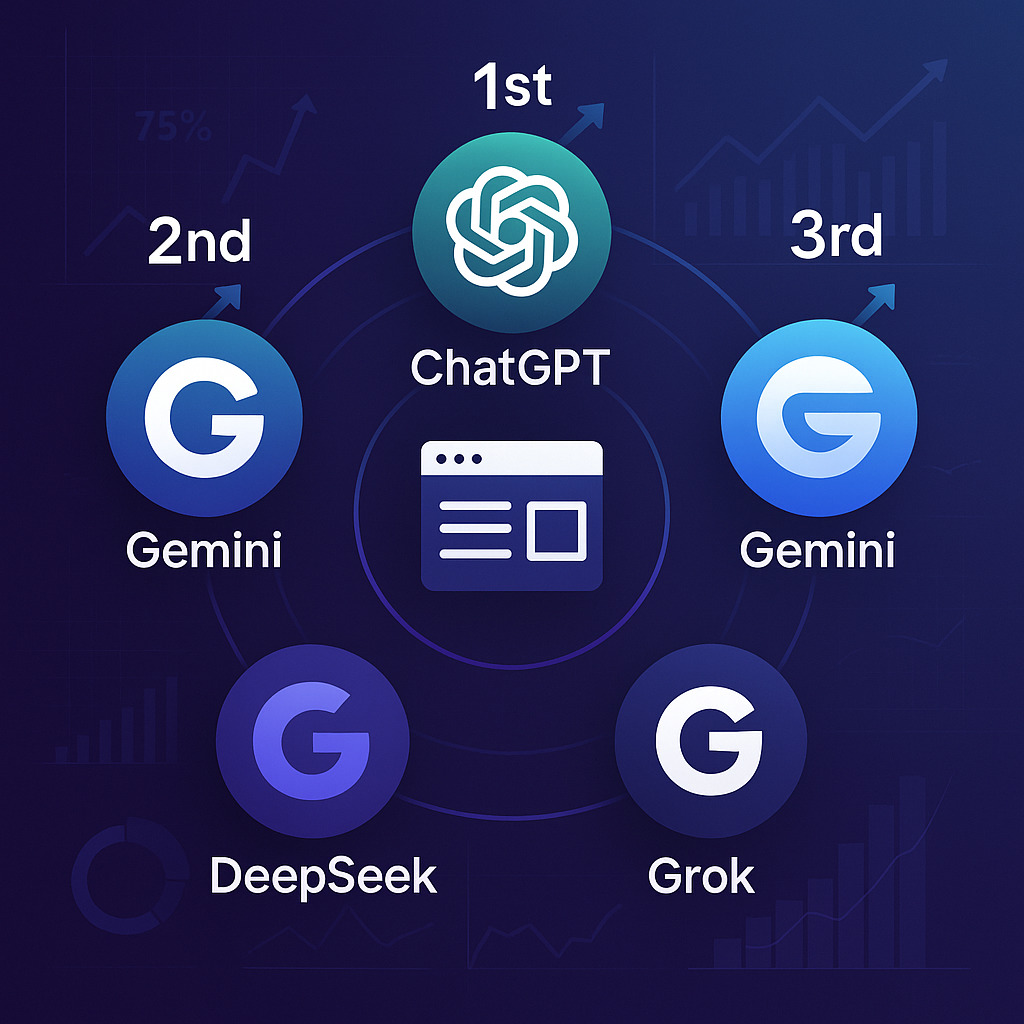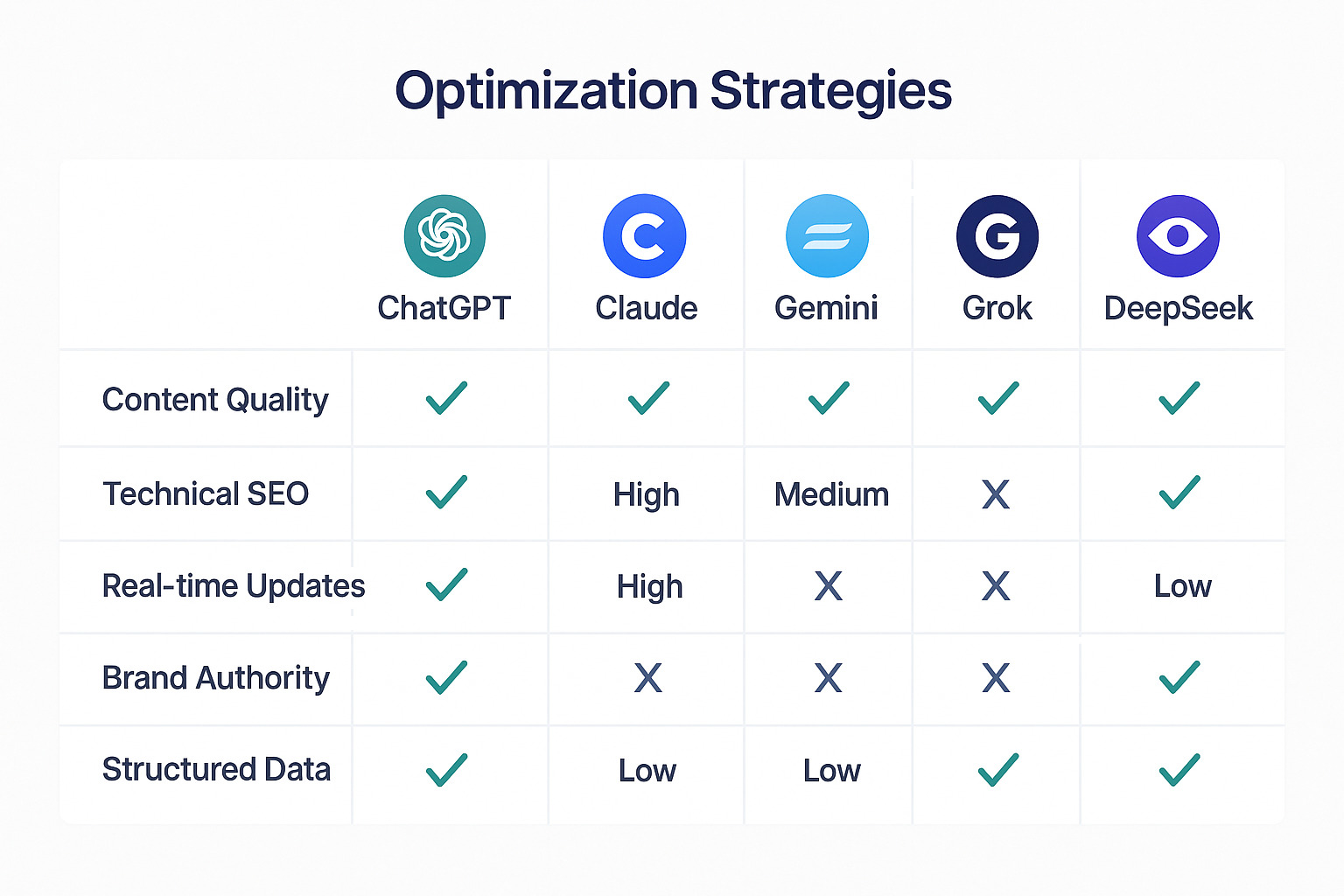How to Rank Your Website in AI Search Engines: The Complete 2025 Guide to LLM Optimization

The AI Search Revolution is Here
The digital marketing landscape has undergone a seismic shift. While traditional search engines still dominate traffic, AI-powered search engines and large language models (LLMs) are rapidly becoming the go-to source for information discovery. From ChatGPT's staggering 5.19 billion monthly visits to Claude's growing 73 million users, these platforms are reshaping how people find and consume content.
Understanding how to rank your website in ChatGPT, get recommended by Claude, optimize for Gemini, appear in Grok searches, and leverage DeepSeek's algorithms isn't just a competitive advantage—it's becoming essential for digital survival. The rise of what experts call "Generative Engine Optimization" (GEO) represents the next evolution of SEO, where businesses must optimize not just for search crawlers, but for AI recommendation systems.
As of 2025, ChatGPT holds 59.5% of the generative AI chatbot market, while Microsoft Copilot commands 14.3%, followed by Google Gemini and Claude. This fragmentation means businesses can no longer rely on a single optimization strategy—they must understand the unique ranking factors that drive visibility across each platform.
Understanding the AI Search Ecosystem
ChatGPT: 5.19 billion monthly visits, 59.5% market share
Google Gemini: 284.1 million monthly visits, 140 million users
Claude AI: 73 million users, 4.19% traffic growth
Grok AI: 51.5 million monthly visits, 19.12% US traffic
DeepSeek: 96.88 million monthly active users (#4 globally)
According to Adobe, 55% of consumers already use AI-powered search to research products, and 47% rely on it for recommendations. This trend is accelerating as AI search experiences become more sophisticated and user-friendly.
The fundamental difference between traditional SEO and AI optimization lies in how content is discovered and recommended. While Google's algorithm focuses on links, keywords, and traditional ranking signals, AI systems prioritize content quality, semantic understanding, and relevance to user intent.
How to Rank Your Website in ChatGPT
Understanding ChatGPT's Ranking Algorithm
ChatGPT doesn't rank website pages like Google does, but it shares a preference for high-quality, well-written, and relevant content. The platform prioritizes content from reliable sources that demonstrate expertise, credibility, and strong reputations.
Key Ranking Factors for ChatGPT
Content Quality and Depth: Content should be accurate, comprehensive, and well-researched to rank in ChatGPT. You should cover the entire user intent, not just target keywords. The platform favors content that provides complete answers to user queries.
Topical Authority: Sites that show expertise and authority in their niche are more likely to rank well for a given query. This means consistently producing high-quality content within your domain of expertise.
Brand Mentions and Social Proof: Frequent positive brand mentions across platforms signal reliability to ChatGPT. High-quality reviews on sites like Trustpilot or Google Reviews also influence rankings.
Freshness and Recency: ChatGPT prioritizes recent and relevant content. Updating older content with current information, mentioning recent developments, and keeping publish dates current can improve visibility.
Optimization Strategies for ChatGPT
- Update your robots.txt file to permit OpenAI access
- Consider implementing an llms.txt file for better AI indexing
- Create question-focused content and FAQ sections
- Optimize for Bing (ChatGPT relies on similar ranking signals)
- Focus on long-form, authoritative content from high-authority sites
- Build brand mentions across authoritative platforms
- Maintain content freshness with regular updates
How to Be Recommended by Claude
Claude AI has experienced significant growth, with traffic increasing by 4.19% compared to the previous month. Understanding Claude's recommendation system is crucial for gaining visibility on this platform.
Key Optimization Factors for Claude
High-Quality Content Creation: Claude excels at analyzing your site architecture to ensure search engines can easily crawl and understand your content. Focus on creating comprehensive, well-structured content that addresses user intent.
Technical SEO Excellence: Claude can actively navigate through your website, identifying technical issues that may impact rankings. Ensure your site has clean architecture, fast loading times, and proper HTML structure.
Semantic Content Structure: Use descriptive headings that create a logical content hierarchy. LLMs like Claude excel at understanding well-structured content with clear sections and subsections.
Demonstrate Expertise: Provide comprehensive coverage of topics with specific examples, data points, and actionable insights. Include credible sources and reference authoritative sources to establish trustworthiness.
Gemini AI Optimization: Ranking Factors and Strategy
Google Gemini recorded 284.1 million total visits in February 2025, with desktop visits reaching 193.3 million and mobile visits totaling 90.83 million. Even though Gemini has fewer users than ChatGPT, it's still the third most popular answer engine with 140 million users.

Gemini's Ranking Factors
Core SEO Signals: Google has indicated that its generative AI search still leans on its established ranking systems for evaluating content, including authority, relevance, and technical SEO.
Conversational Query Alignment: Search queries to Gemini are often full questions or natural language prompts, not shorthand keywords. This means optimizing for conversational queries is essential.
Content Freshness and Updates: How people search is changing, with users asking questions like "what are some good destinations for a summer vacation" instead of "best summer destinations".
Gemini Optimization Strategies
- Continue traditional SEO practices (Gemini relies on Google's core indexing systems)
- Optimize for natural language and conversational queries
- Build authority through online citations and local listings
- Focus on omnichannel SEO strategies for both traditional and AI queries
Grok AI Search Optimization
Grok AI reached 51.5 million visits worldwide in February 2025, with direct search accounting for 66.37% of its website traffic. Grok's integration with X provides 83.79% of its social media traffic, making it unique among AI search platforms.
Grok's Ranking Factors
Real-Time Content Prioritization: Grok, with its real-time data access, prioritizes fresh, up-to-date information. Regularly updating your content and adding new material can significantly boost your relevance.
Structured Data Optimization: Use Article or BlogPosting schema to highlight your content's headline, author, publish date, and main content. Grok can use this info to judge the recency and credibility of your posts.
FAQ Integration: Mark up FAQ sections with FAQPage schema. Grok loves concise Q&A, and by providing FAQs in a structured format, you increase the chance that Grok will pull those answers.
Grok Optimization Strategies
- Focus on content freshness and regular updates
- Answer user intent directly with comprehensive responses
- Maintain content accuracy and correct outdated information
- Use structured data markup for better content understanding
- Establish site context and topical authority
DeepSeek AI: The New Challenger
DeepSeek has experienced explosive growth, with 96.88 million monthly active users as of April 2025, making it the #4 most popular AI app worldwide. DeepSeek grew from 7,475 visitors per day in August 2024 to 22.15 million visitors daily by May 2025.
Understanding DeepSeek's Approach
DeepSeek uses a "mixture-of-experts" system to divide its large model into numerous small submodels, with each one specializing in handling specific types of tasks or data. This unique architecture affects how it discovers and recommends content.
DeepSeek Optimization Considerations
Efficiency-Focused Content: DeepSeek achieved its model's efficiency through innovative architecture that requires less computational power, making it more accessible. This suggests the platform may favor concise, well-structured content.
Technical Content Excellence: DeepSeek-R1 outperforms OpenAI-o1 in certain coding benchmarks, indicating strong technical capabilities. Technical content and detailed explanations may perform well on this platform.
Cost-Effective Approach: The development cost of DeepSeek is under $10 million, significantly lower than competitors with similar capabilities. This efficiency-first approach may influence how the platform evaluates and surfaces content.
Universal Optimization Strategies Across All LLM Platforms
Content Quality Excellence
- Create comprehensive, expert-level content that demonstrates deep expertise
- Implement structured content architecture with clear hierarchical organization
- Maintain content freshness with regular updates and current information
- Provide complete answers to user queries within your domain
- Include credible sources, studies, and expert opinions
Technical Optimization
- Enable AI crawling in robots.txt files
- Optimize page speed and performance metrics
- Implement comprehensive schema markup (Article, FAQ, Organization)
- Ensure mobile-first design and responsiveness
- Maintain clean HTML structure with proper heading hierarchy
Authority Building
- Build topical authority through consistent expertise in specific domains
- Encourage social proof through positive reviews and testimonials
- Create linkable assets including original research and comprehensive guides
- Develop brand mentions across authoritative platforms and publications
- Participate in industry discussions and thought leadership
Measuring Success in AI Search Optimization
Key Performance Indicators
AI Citation Tracking: Monitor how frequently your content appears in AI-generated responses across different platforms. Track which content gets cited most often and analyze patterns.
Brand Mention Monitoring: Track how often your brand is mentioned in AI responses, both directly and indirectly. Positive mentions indicate growing authority within AI systems.
Traffic from AI Platforms: Monitor referral traffic from AI platforms and track which content drives the most engagement from AI-referred users.
Content Performance Analysis: Analyze which types of content perform best across different AI platforms and optimize accordingly.
Tools and Platforms
OmniSEO is a platform worth considering if you're a larger organization looking to scale visibility across answer engines. Businesses can track their rankings across answer engines and monitor competitor rankings for the same phrases.
Traditional analytics tools like Google Analytics, combined with specialized AI tracking tools, provide insights into AI-driven traffic and user behavior patterns.
The Future of AI Search Optimization
Emerging Trends
Integration with Traditional Search: AI-driven search experiences like ChatGPT and Google's AI Overviews are transforming how content gets surfaced—but they haven't made traditional SEO obsolete. The future lies in integrated strategies that work across both traditional and AI search.
Personalization and Context: AI search platforms are becoming increasingly sophisticated in understanding user context, search history, and preferences. Content that adapts to various user intents and contexts will perform better.
Real-Time Information Priority: AI platforms increasingly prioritize real-time, up-to-date information. Businesses must develop systems for keeping content current and relevant.
Preparation Strategies
- Develop diversified optimization approaches that work across multiple AI platforms
- Maintain strong traditional SEO foundations while adapting to AI requirements
- Invest in continuous learning and adaptation as the landscape evolves
- Focus on content quality and relevance as fundamental success factors
- Build systems for maintaining content freshness and accuracy
Conclusion: Mastering the Multi-Platform AI Search Landscape
The era of AI search optimization has arrived, and businesses that adapt quickly will capture disproportionate visibility across these emerging platforms. From ChatGPT's massive user base to Claude's growing influence, from Gemini's integration with Google's ecosystem to Grok's real-time capabilities and DeepSeek's cost-efficient innovation, each platform offers unique opportunities for businesses willing to invest in proper optimization.
Success in this new landscape requires understanding that how to rank your website in ChatGPT differs from how to be recommended by Claude, which differs from optimizing for Gemini, Grok, or DeepSeek. Yet common threads emerge: quality content, technical excellence, authority building, and user-focused optimization remain fundamental.
The businesses that thrive in 2025 and beyond will be those that view AI search optimization not as a replacement for traditional SEO, but as a natural evolution of digital marketing. By implementing the strategies outlined in this guide, you'll be well-positioned to capture visibility across the AI search ecosystem while building a foundation for whatever comes next.
Ready to optimize your website for AI search engines? Start with a comprehensive audit of your current content, implement the technical optimizations outlined above, and begin creating the authoritative, comprehensive content that AI platforms prioritize. The future of search is here—and it's powered by artificial intelligence.